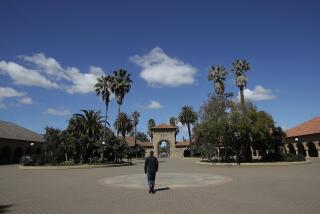Our unlevel playing field
- Share via
AT LEAST A dozen times in the last decade, I’ve read or heard that the United States is coming to the end of the affirmative action era. I don’t believe it.
Americans are always making premature or wrongheaded pronouncements about the ends and beginnings of eras, usually because they want to inflate or deflate the significance of something. For foes of affirmative action, both motives apply. They exaggerate its effectiveness in an attempt to prove how pernicious it is. Then they argue that race consciousness in any form is supremely unimportant.
The guy making this case most recently is former University of California Regent Ward Connerly. Connerly has made a career out of being the black man who opposes affirmative action no matter what, and after a dozen years, he’s satisfied that his work is close to done.
Proposition 209, which banned affirmative action in public education, hiring and contracts, was approved by California voters 10 years ago. Since then, the complexion of the UC student body has paled considerably. Measures modeled after 209 are passing in other parts of the country, including in Michigan earlier this month. On the federal level, the most conservative Supreme Court in modern history looks poised to limit or eliminate the federal mandate that created affirmative action.
Connerly is encouraged by all these good omens. He has said that he feels an “anti-affirmative action wave washing over America” and that he’s following that wave to Oregon, Nevada and other states still in need of conversion. Spreading the gospel, apparently.
The gospel of what, exactly? What I find sad about this crusade, apart from the fact that its spiritual leader is a black man, is that it’s so hellbent on destroying something meant to help folks but offers nothing helpful to take its place. It’s a movement built on people in power gathering up all the marbles (which were mostly theirs to begin with) and going home. The best it can do is preach equality by doing nothing, a kind of free-market approach to solving deep-rooted racial problems. Such an approach only works for those controlling the free market.
But let’s put aside the theoretical and get down to the personal, which is really what drives the anti-affirmative action fervor. My question is this: If I, an African American, was helped along my way at some point by some version of affirmative action, are my accomplishments any less real? Am I less capable because somebody in charge decided that, all candidates being equal but opportunities for some candidates being historically very unequal, I was the best one for the slot?
Connerly likes to argue that beneficiaries of affirmative action self-stigmatize, that they feel conspicuously black, or Latino, or female because somebody has given them the nod. But that’s the worst kind of racialism cloaked as concern. The reality is that people are rarely told what gets them over. Connerly would argue that colored people always assume their color is the reason they got (or didn’t get) the job or the contract or the acceptance letter -- and he agrees with them. Many whites evidently assume merit explains their place. This is the kind of highly evolved, nonracial line of reasoning that Connerly believes we should all aspire to.
But if blacks and other underrepresented ethnic groups assume that they only got the job -- or didn’t -- because of their color, how easily can they change their perspectives and believe that it is because of merit instead? How will they ever tell the difference anyway? (One answer to this riddle is that colored people think far less about the calibration of race and merit than whites do. One of the first comments I got from a watchful reader when I started writing this column a year ago was that I must have been an affirmative action hire. I never asked.)
The most troubling question raised by the potential end of the affirmative action era, however, is what kind of era we can expect next. For 40 years, affirmative action has been a modest political expression of a much bigger vision of America that emphasizes inclusion, and righting past wrongs where feasible, to make our social experiment into something truly great.
If Connerly is right, Americans are now admitting that this is too utopian for their tastes. Now they’re ready to launch a new era in which it’s perfectly OK to acknowledge that America doesn’t really care about a level playing field, if it ever really did. Personally -- and theoretically -- I fear a future like that.
More to Read
Get the L.A. Times Politics newsletter
Deeply reported insights into legislation, politics and policy from Sacramento, Washington and beyond. In your inbox twice per week.
You may occasionally receive promotional content from the Los Angeles Times.










